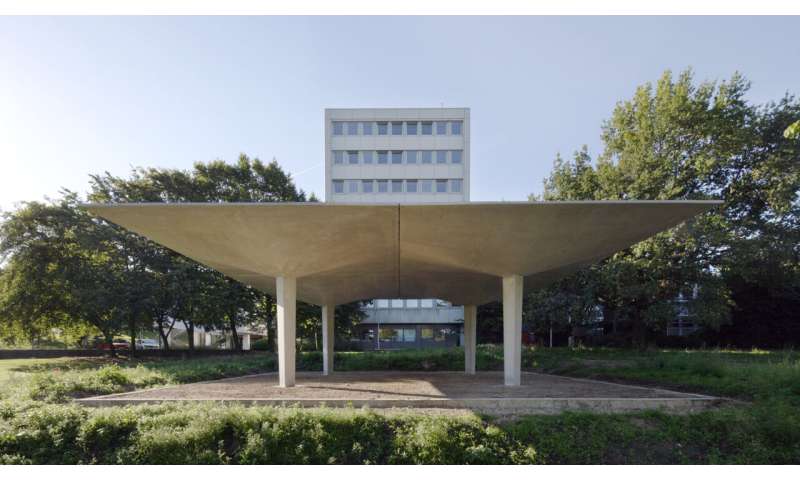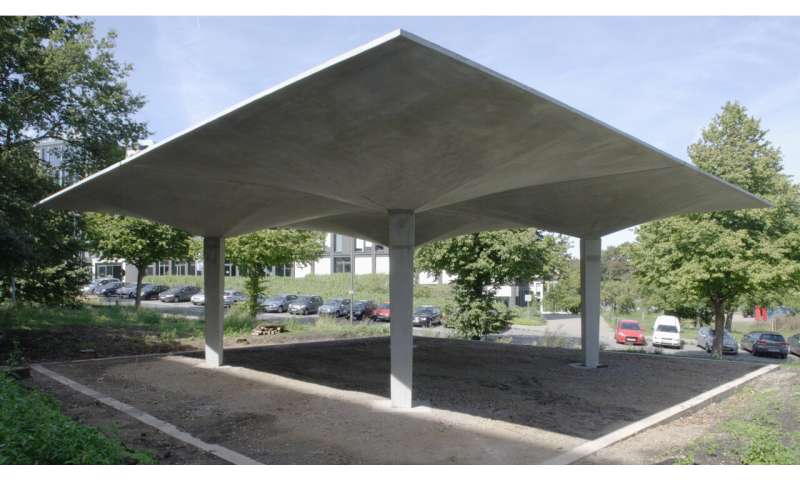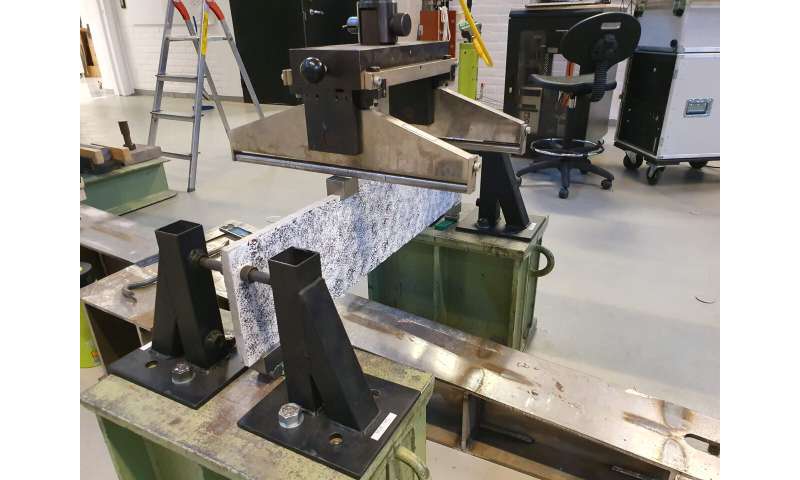New model makes it easier to build sustainable structures of textile-reinforced concrete
By reinforcing concrete with textiles instead of steel, it is possible to use less material and create slender, lightweight structures with a significantly lower environmental impact. The technology to utilize carbon fiber textiles already exists, but it has been challenging, among other things, to produce a basis for reliable calculations for complex and vaulted structures.
Researchers from Chalmers University of Technology, in Sweden, present a method that makes it easier to scale up analyses and thus facilitate the construction of more environmentally friendly bridges, tunnels and buildings.
“A great deal of the concrete we use today has the function to act as a protective layer to prevent the steel reinforcement from corroding. If we can use textile reinforcement instead, we can reduce cement consumption and also use less concrete and thus reduce the climate impact,” says Karin Lundgren, who is Professor in Concrete Structures at the Department of Architecture and Civil Engineering at Chalmers.
Cement is a binder in concrete and its production from limestone has a large impact on the climate. One of the problems is that large amounts of carbon dioxide that have been sequestered in the limestone are released during production. Every year, about 4.5 billion metric tons of cement are produced in the world and the cement industry accounts for about 8% of global carbon dioxide emissions. Intensive work is therefore underway to find alternative methods and materials for concrete structures.
-

Picture from the construction of a pavilion at the RWTH Aachen University of Technology in Germany. The shell-shaped roof structure has been reinforced with carbon fiber textile and is only six centimeters thick. Credit: Robert Mehl
-

Picture from the construction of a pavilion at the RWTH Aachen University of Technology in Germany. The shell-shaped roof structure has been reinforced with carbon fiber textile and is only six centimeters thick. Credit: Robert Mehl
Reduced carbon footprint with thinner constructions and alternative binders
By using alternative binders instead of cement, such as clay or volcanic ash, it is possible to further reduce carbon dioxide emissions. But so far, it is unclear how well such new binders can protect steel reinforcement in the long term.
“You could get away from the issue of corrosion protection, by using carbon-fibers as reinforcement material instead of steel, because it doesn’t need to be protected in the same way. You can also gain even more by optimizing thin shell structures with a lower climate impact,” says Karin Lundgren.
In a study published in the journal Construction and Building Materials, Karin Lundgren and her colleagues describe a new modeling technique that was proved to be reliable in analyses describing how textile reinforcement interacts with concrete. The paper is titled “Textile reinforced concrete members subjected to tension, bending, and in-plane loads: Experimental study and numerical analyses”
“What we have done is to develop a method that facilitates the calculation work of complex structures and reduces the need for testing of the load-bearing capacity,” says Karin Lundgren.
One area where textile reinforcement technology could significantly reduce the environmental impact is in the construction of arched floors. Since the majority of a building’s climate impact during production comes from the floor structures, it is an effective way to build more sustainably. A previous research study from the University of Cambridge shows that textile reinforcement can reduce carbon dioxide emissions by up to 65 percent compared to traditional solid floors.
-

Concrete reinforced with carbon fiber textile. Credit: Stipriaan | Wikimedia Commons
-

Test set-up where textile-reinforced concrete is loaded in the Structures Lab at Chalmers. Credit: Chalmers University of Technology | Sebastian Almfeldt
Method that facilitates calculations
A textile reinforcement mesh consists of yarns, where each yarn consists of thousands of thin filaments (long continuous fibers). The reinforcement mesh is cast into concrete, and when the textile-reinforced concrete is loaded, the filaments slip both against the concrete and against each other inside the yarn.
A textile yarn in concrete does not behave as a unit, which is important when you want to understand the composite material’s ability to carry loads. The modeling technique developed by the Chalmers researchers describes these effects.
“You could describe it as the yarn consisting of an inner and an outer core, which is affected to varying degrees when the concrete is loaded. We developed a test and calculation method that describes this interaction. In experiments, we were able to show that our way of calculating is reliable enough even for complex structures,” says Karin Lundgren.
The work together with colleagues is now continuing to develop optimization methods for larger structures.
“Given that the United Nations Environment Program (UNEP) expects the total floor area in the world to double over the next 40 years due to increased prosperity and population growth, we must do everything we can to build as resource-efficiently as possible to meet the climate challenge,” says Karin Lundgren.
More information:
Adam Sciegaj et al, Textile reinforced concrete members subjected to tension, bending, and in-plane loads: Experimental study and numerical analyses, Construction and Building Materials (2023). DOI: 10.1016/j.conbuildmat.2023.133762
Chalmers University of Technology
Citation:
New model makes it easier to build sustainable structures of textile-reinforced concrete (2024, March 21)
retrieved 22 March 2024
from https://techxplore.com/news/2024-03-easier-sustainable-textile-concrete.html
This document is subject to copyright. Apart from any fair dealing for the purpose of private study or research, no
part may be reproduced without the written permission. The content is provided for information purposes only.

Comments are closed